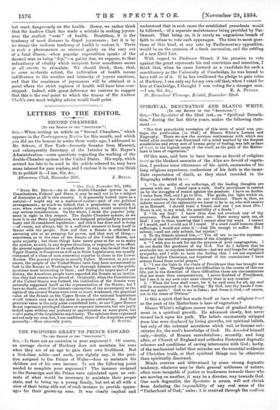"New York, November 9th, 1884.
"Dees MR. BRYCH,—A8 to the double-Chamber system in our Constitutions, Federal and State, it may be said not to be a subject of discussion at all in this country. It is generally looked upon as a natural—I might say as a matter-of-course—part of our political arrangements ; so much so, indeed, that a proposition to abolish it, even when coming from a respectable quarter, would scarcely find any serious consideration. On the whole, I think the popular judg- ment is right in this respect. The double-Chamber system, as we have it in our State Legislatures, was designed principally to prevent hasty and ill-considered legislation ; and this it has done and is doing —of course, not always, but in a sufficient measure to keep itself in favour with the people. Now and then a Senate is criticised as assuming airs or as grasping for power, and that sort of thing,— sometimes, as in the case of the Senate of the United States, not quite unjustly ; but these thicgs have never gone so far as to make the system, as such, in any degree obnoxious, or unpopular, or to affect the general appreciation of its usefulness. It may also be said that the Upper Houses, in Congress as well as in State Legislatures, are usually composed of a class of men somewhat superior to those in the Lower Houses. The general average is usually higher. Moreover, as you are aware, the people of the United States have long been accustomed to look to the Senate at Washington for thorough debates on the public questions most interesting to them ; and during the larger part of our history, the American people have regarded the Senate as an institu- tion they bad reason to be proud of. Originally, when the Constitution of the United States was formed, the institution of the Senate very naturally suggested itself as the representation of the States ; but I have no doubt, even if the historic conception of the sovereignty or the rights of the several States were ever so much weakened, the practical value of the Senate as the Upper House of the national Legislature would remain very much the same in popular estimation. And that practical value is the only point considered here, as our Upper Houses do not represent privileged classes or separate interests, but are justly looked upon without any jealousy or apprehension as mere parts, but useful parts, of the Legislative machinery. The opinions here expressed are not only my own, but, I am confident, those of the American people






































 Previous page
Previous page